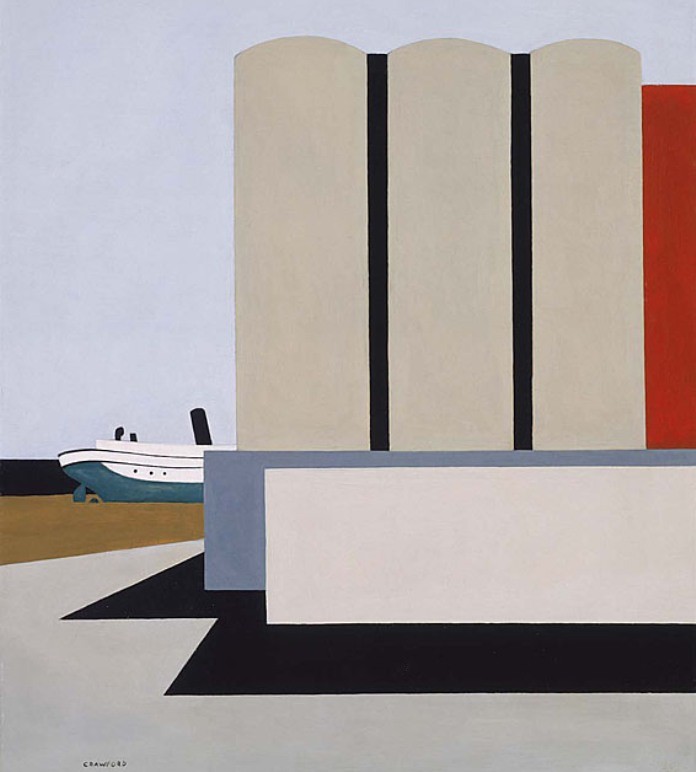.

All the inconsequential memoria
Seeping into the monody: voyages,
Purposes, cargos, ports of call whose names,
Long since forgot, returned to him in dreams
Only to be forgot again by morning --
Supposing those were really dreams, and this morning.
Boat and Grain Elevators No. 2: Ralston Crawford, 1942 (The Phillips Collection, Washington, D.C.)



14 comments:
I was so affected when I first saw this that I tried to write something, but then couldn’t because I was so strongly drawn back again to look at the painting and re-read the poem, which so movingly and perfectly accompanies and complements it.
I love Ralston Crawford’s paintings so much (and Tom Clark’s poems also). I’ve been so wrapped up in other problems that I hadn’t thought of Crawford for a while, but a couple of days ago I read a painful article about the Lawrence Salander/Salander O’Reilly Gallery dealer defalcation (kind of a combination Charles Manson/Robert Maxwell affair in terms of perversion and cruelty) that involved, among other things, astonishing acts of fraud against Crawford’s, Stuart Davis’s, and some other artists’ legal estates.
My Crawford memories and feelings, which were intense, flowed back, along with horror about Salander’s crimes. (He’s in the Rikers Island prison facility now; I doubt he’ll see daylight again.)
Then thankfully this, which redeems and confers for me everything that will, and I always knew would, last.
What’s so nice here is the way the structure, intention and mood of the poem aligns with the structure, intention (as I divine it) and mood of the picture: “inconsequential memoria”; “Purposes”; “dreams”; “Supposing”.
And most of all the planes upon planes and the colors of the words.
Thank you. I imagine your Boats affects everyone exactly this way.
I suppose it all is it all is it all is.
Beautiful, Tom. Also, I got your book. I am loving it.
~R
Also thought you might enjoy this. It's quite a plogily.
tom,
a beautiful poem...and i cldnt agree with curtis more..
planes on planes and the colors of the words...very astutely put by him...
'inconsequential' just made it....beautiful
Curtis,
Nasty about the Salander affair.
I hate to say this, though, but I've always had this creepy inner sense that if you scratched the surface of any big time dealer/broker of practically anything, you'd be at least as likely to find a Salander as a Saint Teresa.
A stroke and Riker's, that's a pretty serious wage of retribution, in any case.
And at least Crawford wasn't around for it.
Indeed, when he was still alive (which of course is what really counts), he did do well to find a generous patron in Duncan Phillips.
About the poem -- "And most of all the planes upon planes and the colors of the words" -- gets it perfectly.
The challenge here was in the matching. The minimalism and simple precision of colour and plane in the Crawford, the overall cool tonal feel of it, set the bar very high. That is always helpful.
The poem was originally a sonnet. The octet laid out the nautical metaphor.
My Muse suggested it was just so much stuffing, me in my "Fifties" rhetorical mode.
(Guilty as charged, I suppose... I've long felt that being accused of Fifties Bad was at least preferable to being accused of Sixties Bad.)
So I decapitated the sonnet, and lo, suddenly things dropped into place rather nicely.
The exercise went on for a week before and a night after the Elections, to which, finally, it proved, in a curious way, a sort of neutralizing antidote. Concentrating on the work, I mean.
(Oh, and by the way, Curtis, you probably haven't noticed it -- after all, you do have an actual LIFE -- but a few nights ago I left a bit for you and Jane on your Bo Diddley.)
Manik,
Many, many thanks.
Robb,
Ah, those were the days, sort of. It gets me all plogily, just thinking about them.
Tom,
Thanks for this (words and picture and 'comment') and yes, as Curtis says, "Supposing [those were really dreams, and this morning]" - - - -
11.3
light coming into sky above still black
ridge, black shapes of leaves on branch
in foreground, wave sounding in channel
temporal totality of object
on the other hand, if
that is, one is there which
in itself, as such is
silver of sunlight reflected in channel,
white cloud in pale blue sky on horizon
Tom,
that is to say (not quite forgot), "11.4"
Steve,
Yes, that's... what? the rub? or the glass half-full...?
Tom, mi dominio del inglés es muy inseguro, por eso no puedo apreciar tus poemas en toda su dimensión (y esa es la razón por la que no acostumbro comentarlos). Sin embargo, quería al menos decir que esta conjunción de palabras e imagen que aquí creaste me conmovió.
Me encantaron los versos del comienzo que son los que estructuran todo el poema, creo yo. Transmiten una imagen perfecta de cómo la vida es la sumatoria de recuerdos y conducen al final inexorable " All the inconsequential memoria / Seeping into the monody". Quizás estoy haciendo una lectura equivocada por conocer poco el idioma, pero al fin y al cabo la literatura también se forma de lecturas erradas ¿no?
Julia,
"La Vida es la sumatoria de recuerdos y Conducen al final inexorable ..."
Es cierto, tanto como una declaración sobre la vida y como un relato de lo que este poema es diciendo.
Thank you. Saying that words is easy, accepting it an living that idea - not so much.
De acuerdo.
Post a Comment